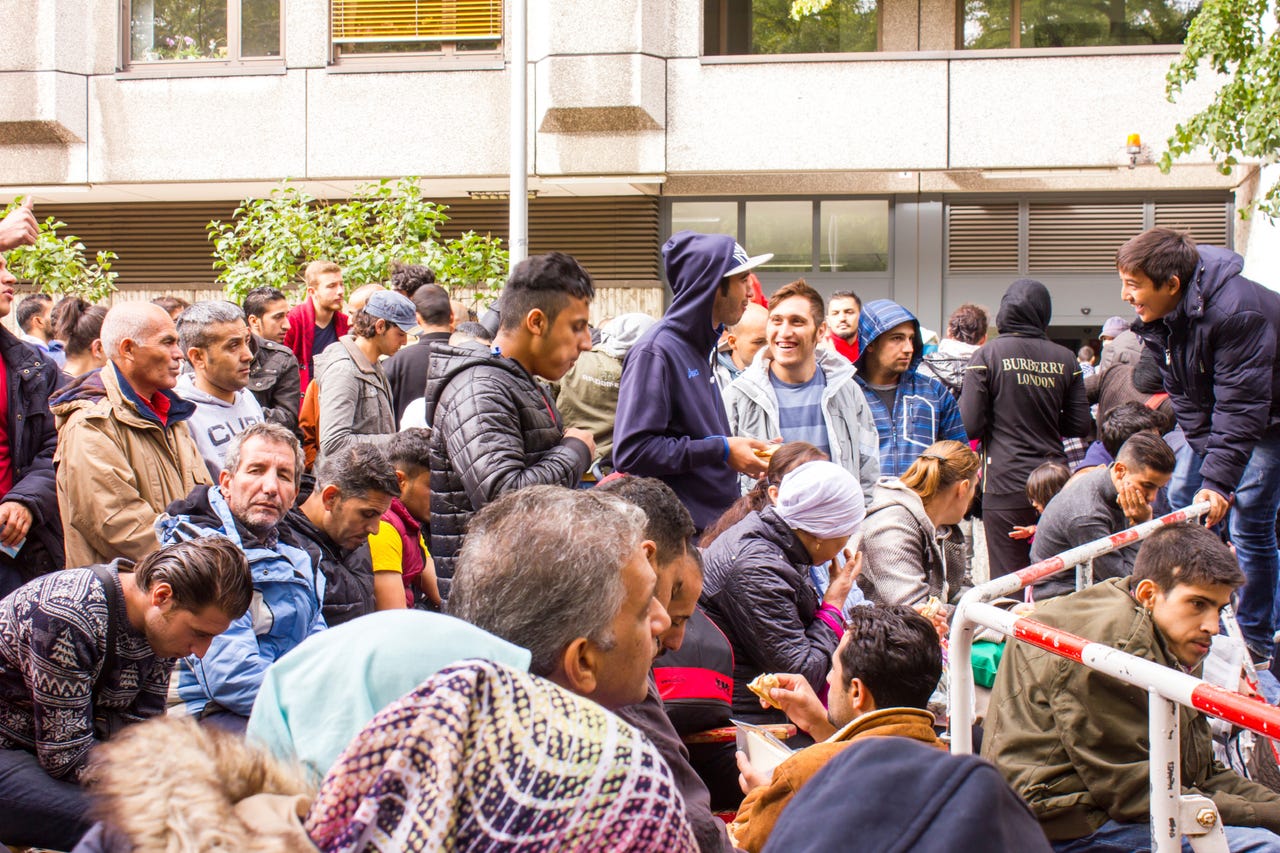As more refugees reach Germany, here's how its tech community has responded


Now, with more than 800,000 having already arrived, the country's IT community is getting down to the practical issues of devising ways to help refugees through technology.
Many of the asylum seekers face the harsh reality of living in a foreign country known for its challenging language and even more challenging bureaucracy.
"We had unprecedented numbers of refugees coming in over such a short period of time, and at the same time, we saw a really failing state unable to respond in an appropriate manner," internet activist Anke Domscheit-Berg said. "It looked like a disastrous country, not like fourth-biggest economic force in the world."
Refugees have encountered overburdened government offices as well as language barriers and encampment-style shelters, with little privacy and few amenities. Seeing a need, many in the German tech community came forward to help.
A former Microsoft director, Domscheit-Berg had experience hosting Random Hacks of Kindness events and decided to organise the Refugee Hackathon in Berlin.
See also
"IT cannot solve all the problems, but it can help with some of them," she said.
The current refugee crisis in Europe has been marked not only by its size but by its use of technology. Many of the people fleeing war-torn countries such as Syria and Iraq arrived with few belongings, but most brought their smartphones.
"We expect that about 80 percent of all refugees have smartphones," Viola Klein, executive director of the software company Saxonia Systems, said.
"And that should not be seen as a luxury. For the refugees, their smartphone is their connection to their homeland, their main means to obtain information."
Together with Heinrich Reuter & Solutions, Saxonia Systems developed a Welcome-App to help refugees find their way around Dresden. Other notable tech solutions include Workeer, a job-placement platform developed by two communications design students.
But perhaps the most ambitious efforts have come out of the hackathon organised by Domscheit-Berg. About 300 people participated in the two-day hackathon, including about 40 refugees, who were on-hand to help identify the most pressing needs. Now, 18 projects are in the works. Some expanded existing ideas while others were brand new.
Domscheit-Berg said one of the most urgently needed projects was Home4Refugees, an Airbnb-style platform that matches refugees with volunteers willing to house them.
Currently, many asylum seekers are living in tents or large spaces not normally used for habitation, such as empty offices and markets, even Berlin's abandoned Tempelhof airport.
While there are some existing services for finding refugees more appropriate housing, they either involve a prohibitive amount of paperwork, as in the case of the government's process, or are technologically simple, relying on volunteers to match user requests to homes manually.
A hackathon team is creating a platform with a database that takes uploaded structured content and give structured output. The final version of Home4refugees is expected to launch in mid-January.
Other hackathon projects aim to help asylum seekers deal with living in a foreign language, such as a translation app called Interpreteer, which identifies locals willing to translate a document, attend an appointment or just meet for a language exchange. There's also EinsteigDeutsch, or entry to German, an app for learning the basics of the language.
The hackathon also produced an online tool, MapFix, which works around the language problem by using symbols on global maps, so refugees can easily find key places such as supermarkets, doctors and transit stations. The resulting customised map can be saved or printed. The ultimate goal is to make MapFix available to refugees not just in Germany but anywhere in the world.
Another project tries to mitigate a failing of the German governmental system. The app LaGeSoNum simply alerts asylum seekers when their numbers have been called at the office of health and social services in Berlin, abbreviated LaGeSo in German.
Long lines and unclear appointment times at the LaGeSo have resulted in hundreds of people waiting outside, sometimes even sleeping overnight, to avoid missing appointments.
Still, even the most dedicated hackers in Germany can't solve the number one problem the refugees identified: the lack of internet access.
Most shelters do not have internet service, and few people are willing to set up free Wi-Fi hotspots in Germany because of a regulation called Störerhaftung.
Domscheit-Berg believes there is no translation for this word because "there is no other country that is as stupid as we are to have such a thing". In effect, Störerhaftung means that a provider of a free internet access point is responsible for any illegal activity somebody does with that access, even downloading a song or video without permission.Still, there are volunteers trying to find solutions to give refugees that critical connection. Volker Werbus with Refugees Online in the Munich area is one.
"It all starts with bureaucracy," Werbus said.
Since Refugees Online needs government permission for each shelter before it can provide service, Werbus has to convince skeptical bureaucrats over and over again that internet access is a necessity, not a luxury.
Then, there's often an infrastructure challenge. Many refugee shelters are in former military facilities, and volunteers need to install infrastructure from scratch, often without making any modifications to the building, which sometimes means they can't even drill a hole in a wall.
Still, volunteers cope by doing such things as running expensive, flat Ethernet cabling through the windows. Large shelters also require robust carrier-grade systems rather than simple home routers, which also increases the cost.
As for Störerhaftung, as an association Refugees Online can claim "provider privilege" under German law. The non-profit has to register every refugee who wants to use the service and has to have them sign a form saying they understand the legal restrictions of using the internet. Each refugee then gets a voucher code, and the system records logon and logoff times.
The whole process is time-consuming and expensive. Werbus feels fortunate to get donations from individuals, churches and corporations such as Microsoft, Lush Cosmetics and Teradata. Still, providing internet access without any government support has been difficult.
"On my Christmas wishlist are only two things," Werbus said. "A general permission for volunteers to provide internet access in refugee camps and some funding from the government."